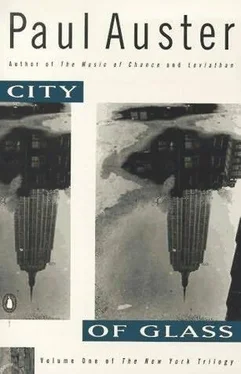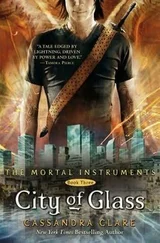Paul Auster - City of Glass
Здесь есть возможность читать онлайн «Paul Auster - City of Glass» весь текст электронной книги совершенно бесплатно (целиком полную версию без сокращений). В некоторых случаях можно слушать аудио, скачать через торрент в формате fb2 и присутствует краткое содержание. Жанр: Современная проза, на английском языке. Описание произведения, (предисловие) а так же отзывы посетителей доступны на портале библиотеки ЛибКат.
- Название:City of Glass
- Автор:
- Жанр:
- Год:неизвестен
- ISBN:нет данных
- Рейтинг книги:5 / 5. Голосов: 1
-
Избранное:Добавить в избранное
- Отзывы:
-
Ваша оценка:
- 100
- 1
- 2
- 3
- 4
- 5
City of Glass: краткое содержание, описание и аннотация
Предлагаем к чтению аннотацию, описание, краткое содержание или предисловие (зависит от того, что написал сам автор книги «City of Glass»). Если вы не нашли необходимую информацию о книге — напишите в комментариях, мы постараемся отыскать её.
City of Glass — читать онлайн бесплатно полную книгу (весь текст) целиком
Ниже представлен текст книги, разбитый по страницам. Система сохранения места последней прочитанной страницы, позволяет с удобством читать онлайн бесплатно книгу «City of Glass», без необходимости каждый раз заново искать на чём Вы остановились. Поставьте закладку, и сможете в любой момент перейти на страницу, на которой закончили чтение.
Интервал:
Закладка:
At 84th Street he paused momentarily in front of a shop. There was a mirror on the facade, and for the first time since he had begun his vigil, Quinn saw himself. It was not that he had been afraid to confront his own image. Quite simply, it had not occurred to him. He had been too busy with his job to think about himself, and it was as though the question of his appearance had ceased to exist. Now, as he looked at himself in the shop mirror, he was neither shocked nor disappointed. He had no feeling about it at all, for the fact was that he did not recognize the person he saw there as himself. He thought that he had spotted a stranger in the mirror, and in that first moment he turned around sharply to see who it was. But there was no one near him. Then he turned back to examine the mirror more carefully. Feature by feature, he studied the face in front of him and slowly began to notice that this person bore a certain resemblance to the man he had always thought of as himself. Yes, it seemed more than likely that this was Quinn. Even now, however, he was not upset. The transformation in his appearance had been so drastic that he could not help but be fascinated by it. He had turned into a bum. His clothes were discolored, disheveled, debauched by filth. His face was covered by a thick black beard with tiny flecks of gray in it. His hair was long and tangled, matted into tufts behind his ears, and crawling down in curls almost to his shoulders. More than anything else, he reminded himself of Robinson Crusoe, and he marveled at how quickly these changes had taken place in him. It had been no more than a matter of months, and in that time he had become someone else. He tried to remember himself as he had been before, but he found it difficult. He looked at this new Quinn and shrugged. It did not really matter. He had been one thing before, and now he was another. It was neither better nor worse. It was different, and that was all.
He continued uptown for several more blocks, then turned left, crossed Fifth Avenue, and walked along the wall of Central Park. At 96th Street he entered the park and found himself glad to be among the grass and trees. Late summer had exhausted much of the greenness, and here and there the ground showed through in brown, dusty patches. But the trees overhead were still filled with leaves, and everywhere there was a sparkling of light and shade that struck Quinn as miraculous and beautiful. It was late morning, and the heavy heat of the afternoon lay several hours off.
Halfway through the park Quinn was overtaken by an urge to rest. There were no streets here, no city blocks to mark the stages of his progress, and it seemed to him suddenly that he had been walking for hours. Making it to the other side of the park felt as though it would take another day or two of dogged hiking. He went on for a few more minutes, but at last his legs gave out. There was an oak tree not far from where he stood, and Quinn went for it now, staggering in the way a drunk gropes for his bed after an all-night binge. Using the red notebook as a pillow, he lay down on a grassy mound just north of the tree and fell asleep. It was the first unbroken sleep he had had in months, and he did not wake until it was morning again.
His watch said that it was nine-thirty, and he cringed to think of the time he had lost. Quinn stood up and began loping towards the west, amazed that his strength was back, but cursing himself for the hours he had wasted in getting it. He was beyond consolation. No matter what he did now, lie felt that he would always be too late. He could run for a hundred years, and still he would arrive just as the doors were closing.
He emerged from the park at 96th Street and continued west. At the comer of Columbus Avenue he saw a telephone booth, which suddenly reminded him of Auster and the five-hundred-dollar check. Perhaps he could save time by collecting the money now. He could go directly to Auster, put the cash in his pocket, and avoid the trip to the post office and the bank. But would Auster have the cash on hand? If not, perhaps they could arrange to meet at Auster's bank.
Quinn entered the booth, dug into his pocket, and removed what money was left: two dimes, a quarter, and eight pennies. He dialed information for the number, got his dime back in the coin return box, deposited the dime again, and dialed. Auster picked up on the third ring.
"Quinn here," said Quinn.
He heard a groan on the other end. "Where the hell have you been hiding?" There was irritation in Auster's voice. "I've called you a thousand times."
"I've been busy. Working on the case."
"The case?"
"The case. The Stillman case. Remember?"
"Of course I remember."
"That's why I'm calling. I want to come for the money now. The five hundred dollars."
"What money?"
"The check, remember? The check I gave you. The one made out to Paul Auster."
"Of course I remember. But there is no money. That's why I've been trying to call you."
"You had no right to spend it," Quinn shouted, suddenly beside himself "That money belonged to me."
"I didn't spend it. The check bounced."
"I don't believe you."
"You can come here and see the letter from the bank, if you want. It's sitting here on my desk. The check was no good."
"That's absurd."
"Yes, it is. But it hardly matters now, does it?"
"Of course it matters. I need the money to go on with the case.
"But there is no case. It's all over."
"What are you talking about?"
"The same thing you are. The Stillman case."
"But what do you mean 'it's over'? I'm still working on it."
"I can't believe it."
"Stop being so goddamn mysterious. I don't have the slightest idea what you're talking about."
"I don't believe you don't know. Where the hell have you been? Don't you read the newspapers?"
"Newspapers? Goddamit, say what you mean. I don't have time to read newspapers."
There was a silence on the other end, and for a moment Quinn felt that the conversation was over, that he had somehow fallen asleep and had just now woken up to find the telephone in his hand.
"Stillman jumped off the Brooklyn Bridge," Auster said. "He committed suicide two and a half months ago."
"You're lying."
"It was all over the papers. You can check for yourself."
Quinn said nothing.
"It was your Stillman," Auster went on. "The one who used to be a professor at Columbia. They say he died in mid-air, before he even hit the water."
"And Peter? What about Peter?"
"I have no idea."
"Does anybody know?"
"Impossible to say. You'd have to find that out yourself."
"Yes, I suppose so," said Quinn.
Then, without saying good-bye to Auster, he hung up. He took the other dime and used it to call Virginia Stillman. He still knew the number by heart.
A mechanical voice spoke the number back to him and announced that it had been disconnected. The voice then repeated the message, and afterwards the line went dead.
Quinn could not be sure what he felt. In those first moments, it was as though he felt nothing, as though the whole thing added up to nothing at all. He decided to postpone thinking about it. There would be time for that later, he thought. For now, the only thing that seemed to matter was going home. He would return to his apartment, take off his clothes, and sit in a hot bath. Then he would look through the new magazines, play a few records, do a little housecleaning. Then, perhaps, he would begin to think about it.
He walked back to 107th Street. The keys to his house were still in his pocket, and as he unlocked his front door and walked up the three flights to his apartment, he felt almost happy. But then he stepped into the apartment, and that was the end of that.
Everything had changed. It seemed like another place altogether, and Quinn thought he must have entered the wrong apartment by mistake. He backed into the hall and checked the number on the door. No, he had not been wrong. It was his apartment; it was his key that had opened the door. He walked back inside and took stock of the situation. The furniture had been rearranged. Where there had once been a table there was now a chair. Where there had once been a sofa there was now a table. There were new pictures on the walls, a new rug was on the floor. And his desk? He looked for it but could not find it. He studied the furniture more carefully and saw that it was not his. What had been there the last time he was in the apartment had been removed. His desk was gone, his books were gone, the child drawings of his dead son were gone. He went from the living room to the bedroom. His bed was gone, his bureau was gone. He opened the top drawer of the bureau that was there. Women's underthings lay tangled in random clumps: panties, bras, slips. The next drawer held women's sweaters. Quinn went no further than that. On a table near the bed there was a framed photograph of a blond, beefy-faced young man. Another photograph showed the same young man smiling, standing in the snow with his arm around an insipid-looking girl. She, too, was smiling. Behind them there was a ski slope, a man with two skis on his shoulder, and the blue winter sky.
Читать дальшеИнтервал:
Закладка:
Похожие книги на «City of Glass»
Представляем Вашему вниманию похожие книги на «City of Glass» списком для выбора. Мы отобрали схожую по названию и смыслу литературу в надежде предоставить читателям больше вариантов отыскать новые, интересные, ещё непрочитанные произведения.
Обсуждение, отзывы о книге «City of Glass» и просто собственные мнения читателей. Оставьте ваши комментарии, напишите, что Вы думаете о произведении, его смысле или главных героях. Укажите что конкретно понравилось, а что нет, и почему Вы так считаете.












